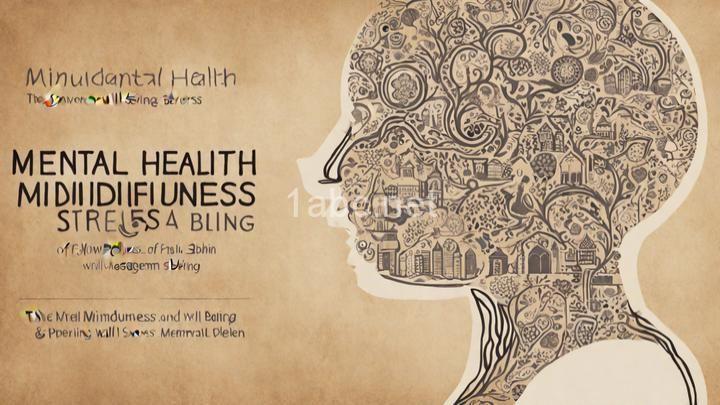The Power of Mindfulness in Stress Management and Mental Well-being
Introduction:
I. Understanding Mindfulness:
II. Benefits of Mindfulness for Stress Management:
III. How Mindfulness Improves Mental Well-being:
IV. Practical Techniques for Incorporating Mindfulness into Daily Life:
V. Overcoming Challenges in Practicing Mindfulness:
VI. Tips for Sustaining a Regular Mindfulness Practice:
Conclusion:

Introduction:
Are you tired of feeling overwhelmed by stress and longing for some peace of mind? Look no further, because the key to managing stress and improving mental well-being lies within the practice of mindfulness. In this blog post, we will explore the incredible power of mindfulness in stress management and enhancing mental well-being. So, get ready to embark on a journey of self-discovery and learn how mindfulness can transform your life.
I. Understanding Mindfulness:
Before we dive into the benefits of mindfulness, let's first understand what it really means. Mindfulness can be defined as the act of being fully present in the moment, without judgment. It is about paying attention to our thoughts, feelings, and sensations in a non-reactive way. While mindfulness has its roots in ancient practices like Buddhism, it has gained significant recognition in modern psychology. Today, mindfulness is being integrated into various therapeutic interventions and self-help techniques, making it accessible to people from all walks of life. The growing popularity of mindfulness practices worldwide is a testament to its effectiveness in promoting mental well-being.
II. Benefits of Mindfulness for Stress Management:
One of the primary reasons people turn to mindfulness is to alleviate stress and anxiety. By practicing mindfulness, we can cultivate increased self-awareness, which allows us to recognize stress triggers and respond to them in a healthier way. When we are mindful, we become more attuned to our thoughts and emotions, enabling us to step back and observe them without getting caught up in their whirlwind. This non-reactivity to negative thoughts or situations helps us build emotional resilience, enabling us to navigate stressful circumstances with greater ease. Moreover, mindfulness enhances our ability to focus and concentrate, which in turn boosts our productivity and overall well-being.
III. How Mindfulness Improves Mental Well-being:
Beyond stress management, mindfulness has a profound impact on our mental well-being. By practicing mindfulness, we learn to foster a positive mindset by nurturing gratitude and self-compassion. When we are present in the moment, we become more aware of the beauty and joys that surround us, leading to a greater sense of fulfillment. Additionally, mindfulness promotes emotional regulation, reducing the risk of depression and other mental health issues. By cultivating a sense of inner peace, mindfulness helps us find balance and stability in our lives, leading to improved overall well-being.
IV. Practical Techniques for Incorporating Mindfulness into Daily Life:
Now that we understand the benefits of mindfulness, let's explore some practical techniques for incorporating it into our daily lives. One simple yet powerful practice is breathing exercises. Techniques like diaphragmatic breathing or box breathing can be easily integrated into our routines, helping us anchor ourselves in the present moment. Another effective technique is body scan meditation, where we systematically bring our attention to different parts of our body, noticing any sensations or areas of tension. This practice helps us connect with our bodies and bring a sense of groundedness. Additionally, mindful eating is a wonderful practice that encourages us to savor each bite, bringing our full attention to the flavors, textures, and sensations of our meals.
V. Overcoming Challenges in Practicing Mindfulness:
While the benefits of mindfulness are undeniable, practicing it consistently can be challenging. Lack of time or difficulty quieting the mind are common obstacles that many face. However, there are practical solutions to overcome these challenges. One approach is to integrate mindfulness into our daily routines. We can start by engaging in short mindfulness exercises during everyday activities, such as brushing our teeth or taking a shower. Another helpful strategy is to utilize guided meditation apps, which provide step-by-step instructions and help us stay focused. By experimenting with different techniques and finding what works best for us, we can overcome these obstacles and make mindfulness a regular part of our lives.
VI. Tips for Sustaining a Regular Mindfulness Practice:
Consistency is key when it comes to mindfulness practice. It's better to have shorter but regular practice sessions than occasional long ones. Setting realistic goals and tracking our progress can also help us stay motivated. Keeping a mindfulness journal or using an app to record our practice can be a great way to track our growth and celebrate small victories. Moreover, finding a community of like-minded individuals who share our interest in mindfulness can provide support and encouragement along the way. Whether it's joining a local meditation group or subscribing to online mindfulness newsletters, connecting with others can enhance our mindfulness journey.
Conclusion:
Mindfulness holds immense power in stress management and mental well-being. By practicing mindfulness, we can reduce stress and anxiety, enhance emotional resilience, and cultivate a positive mindset. It promotes emotional regulation, reduces the risk of mental health issues, and fosters a sense of inner peace. So, why wait? Start integrating mindfulness into your life and experience its transformative power. Remember, it's a journey, and every step counts. Subscribe to our newsletter or join a mindfulness community to stay connected and continue your mindfulness practice. Embrace the present moment and unlock the full potential of your mind.
FREQUENTLY ASKED QUESTIONS
What is mindfulness and how can it help with stress management?
Mindfulness is the practice of being fully present and aware of the present moment, without judgment. It involves paying attention to your thoughts, feelings, and sensations in a non-reactive way. Mindfulness can help with stress management by promoting relaxation, reducing anxiety, and increasing self-awareness.When we practice mindfulness, we train our minds to focus on the present moment instead of dwelling on the past or worrying about the future. This allows us to let go of stress and anxiety that may be weighing us down. By being fully present, we can better understand our thoughts and emotions, and respond to them in a more calm and balanced manner.
Mindfulness can also help us develop a greater sense of self-awareness. By tuning into our thoughts and sensations, we can identify the triggers and patterns that contribute to our stress. This awareness empowers us to make conscious choices and take proactive steps to manage stress more effectively.
In addition to reducing stress, mindfulness can have a positive impact on our overall well-being. It has been shown to improve focus and concentration, enhance emotional resilience, and promote a sense of peace and contentment.
To incorporate mindfulness into your daily life, you can start by setting aside a few minutes each day to practice. Find a quiet and comfortable space where you can sit or lie down. Close your eyes and take a few deep breaths, allowing yourself to relax. Focus your attention on your breath, noticing the sensation of each inhale and exhale. Whenever your mind starts to wander, gently bring your attention back to your breath.
As you become more comfortable with this practice, you can expand it to other activities throughout your day. Whether you're eating, walking, or even doing household chores, try to bring your full attention to the present moment. Notice the sights, sounds, and sensations around you, without judgment.
Remember, mindfulness is a skill that takes time and practice to develop. Be patient with yourself and approach it with an open mind. With consistent effort, you can harness the power of mindfulness to effectively manage stress and cultivate a greater sense of well-being.
How does mindfulness improve mental well-being?
Mindfulness is a practice that involves being fully present in the moment, without judgment. It can greatly contribute to improving mental well-being in various ways.Firstly, mindfulness helps to reduce stress and anxiety. By focusing on the present moment and acknowledging our thoughts and emotions without getting caught up in them, we can develop a sense of calmness and relaxation. This can be particularly beneficial for individuals who struggle with chronic stress or anxiety disorders.
Secondly, mindfulness can enhance self-awareness. Through regular practice, we become more attuned to our thoughts, feelings, and bodily sensations. This increased self-awareness allows us to better understand our emotions and patterns of thinking, enabling us to respond to challenging situations in a more constructive and compassionate manner.
Additionally, mindfulness promotes emotional regulation. By developing the ability to observe our emotions without getting overwhelmed by them, we can cultivate a greater sense of emotional balance and resilience. This can be helpful in managing mood swings, anger, and other intense emotions.
Furthermore, mindfulness improves concentration and focus. The practice requires us to bring our attention back to the present moment whenever our mind wanders. This exercise strengthens our ability to concentrate and reduces distractions, allowing us to be more present and engaged in our daily activities.
Lastly, mindfulness fosters a positive outlook and enhances overall well-being. By cultivating a non-judgmental and accepting attitude towards ourselves and others, we can develop a more compassionate and kind perspective. This shift in mindset can lead to improved relationships, increased self-acceptance, and a greater sense of happiness and contentment.
In conclusion, mindfulness is an effective tool for improving mental well-being. Its ability to reduce stress, enhance self-awareness, regulate emotions, improve concentration, and foster a positive outlook make it a valuable practice for anyone looking to enhance their mental health and overall quality of life.
Can mindfulness be helpful in dealing with everyday stressors?
Yes, mindfulness can be incredibly helpful in dealing with everyday stressors. Mindfulness is the practice of being fully present in the current moment and paying attention to our thoughts, feelings, and sensations without judgment. By cultivating this awareness, we can better understand our stress triggers and learn to respond to them in a more calm and centered way.When we are mindful, we are able to recognize when stress arises and acknowledge it without getting caught up in the whirlwind of our thoughts and emotions. This allows us to respond to stressors more effectively and make conscious choices about how to navigate them.
By practicing mindfulness regularly, we can develop a greater sense of self-awareness and emotional resilience. We become more attuned to our own needs and can better prioritize self-care activities that help us manage stress. Mindfulness also helps us cultivate a sense of gratitude and appreciation for the present moment, which can counterbalance the negative effects of stress.
There are various mindfulness techniques that can be incorporated into our daily lives to help manage stress. These can include deep breathing exercises, body scans, meditation, and mindful movement practices such as yoga or tai chi. Making time for these practices, even just a few minutes a day, can have a significant impact on our overall well-being and ability to handle stress.
Remember, mindfulness is a skill that takes time and practice to develop. Be patient with yourself as you embark on this journey and remember that every moment is an opportunity to bring mindful awareness to your life. By integrating mindfulness into your daily routine, you can cultivate a sense of calm and resilience that will help you navigate the inevitable stressors of everyday life.
How can I incorporate mindfulness into my daily routine?
Incorporating mindfulness into your daily routine can have numerous benefits for your overall well-being. Here are a few simple ways to bring mindfulness into your day:
-
Start your day with intention: Take a few moments upon waking up to set an intention for the day. This can be as simple as focusing on gratitude or choosing to approach the day with a calm and open mindset.
-
Practice mindful breathing: Throughout the day, take regular breaks to focus on your breath. Take slow, deep breaths and notice the sensation of the breath entering and leaving your body. This can help you stay present and centered.
-
Engage in mindful eating: Instead of rushing through your meals, take the time to savor each bite. Pay attention to the flavors, textures, and smells of your food. This can not only enhance your enjoyment of the meal but also help you tune into your body's hunger and fullness cues.
-
Take mindful breaks: Set aside a few moments throughout the day for short mindfulness breaks. Close your eyes, take a few deep breaths, and bring your attention to the present moment. This can help you recharge and refocus.
-
Incorporate mindfulness into daily activities: Whether it's brushing your teeth, taking a shower, or doing household chores, try to bring mindfulness to these activities. Pay attention to the sensations and movements involved, rather than letting your mind wander.
-
Practice gratitude: Take a few moments each day to reflect on what you are grateful for. This can help shift your focus to the positive aspects of your life and cultivate a sense of contentment.
Remember, mindfulness is a practice that requires consistency and patience. Start small and gradually incorporate these techniques into your daily routine. With time, you may find that mindfulness becomes a natural part of your day, bringing a greater sense of peace and presence.




